I’ve written about Seoul five previous times (Walking Seoul part 1, part 2, part 3, I could live in Seoul, and Seoul Stopover), so for a more positive perspective, please read those.
I love Seoul, which is why I keep coming back, beginning or ending all my Asia trips there1. If actions speak louder than words, then Seoul is my favorite city in the world, since I’ve now visited it seven times in the last four years.
I love Seoul because it’s functional at a level few global cities are. On this last visit, my flight from Xi’an landed at 4:45 p.m. and I was on the train into the city by 5:10 p.m. That train, like all the public transport in Korea, was immaculate, respectful, and efficient. Everyone, with the exception of two Western tourists, was on their best behavior, aware of how their actions impacted others. Simple human courtesy is the glue that holds societies together without the need of the heavy hand of the state (i.e police), and Korea, like most of Asia, has it in spades.
I love Seoul because of the LP bars, especially the Woodstock Vinyl bar in Sillim-dong, the neighborhood I’ve chosen as my second home, which I’ve been to so many times I’ve apparently reached the level of a regular, according to the owner who gifts me popcorn after midnight. How she realized I’m a popcorn fanatic, I’m not sure, since I’ve never ordered it, but she has, and whenever the crowd is down to the hardcore few, they get free shots of scotch2 while I get baskets of popcorn.
I love Seoul for my daily ten mile walk in the riverside ecological park, for the coffee shops, and for the food, which I’d argue if not the best cuisine in the world, is certainly in the top five, along with Japanese, French, Italian, and whatever fourth you choose so you don’t yell at me for forgetting.
Korean cuisine is finally getting the global attention it deserves, although what has trickled into the US (aside from in LA) tends to be focused on a few meat-heavy dishes, or Bibimbap, but there’s so much more to it.
I've only scratched the surface of it, partly because the restaurants can be intimidating, especially when eating alone, since so much of the food is built around getting together with friends and cooking things on the table while doing shots of soju, but mostly because I like to be a regular, especially of modest places, and Seoul has so many of those to offer.
There is a density of businesses in Seoul that's almost unmatched in the world. On any one block there can be thirty places to eat, and so I'm still discovering restaurants within a hundred yards of my apartment.
I'm slow to explore these new places because I have a handful of regular modest restaurants I go to that I'm very happy with. They are the Korean equivalent to diners, relaxing and unpretentious, open long hours, and run by older women who are always in them and always fussing over each customer as if she is their mother.
The food in each of these is inexpensive, exceptional, and with more varieties of flavor in each dish than you get in most Japanese meals, yet with the same sense of freshness.

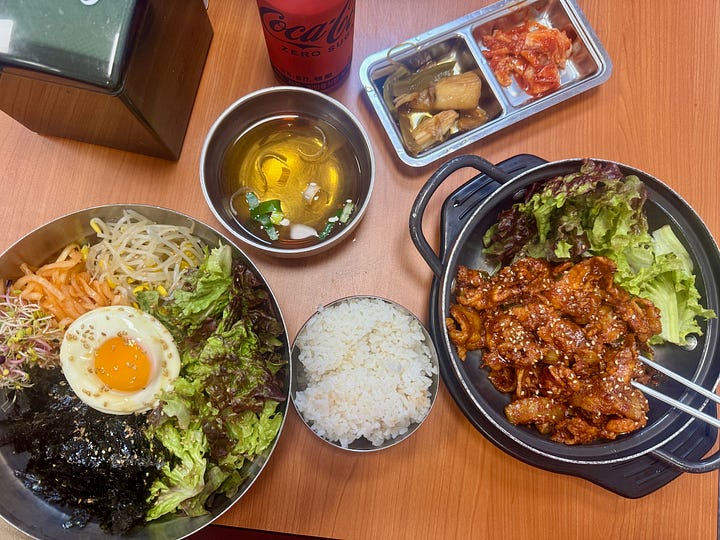

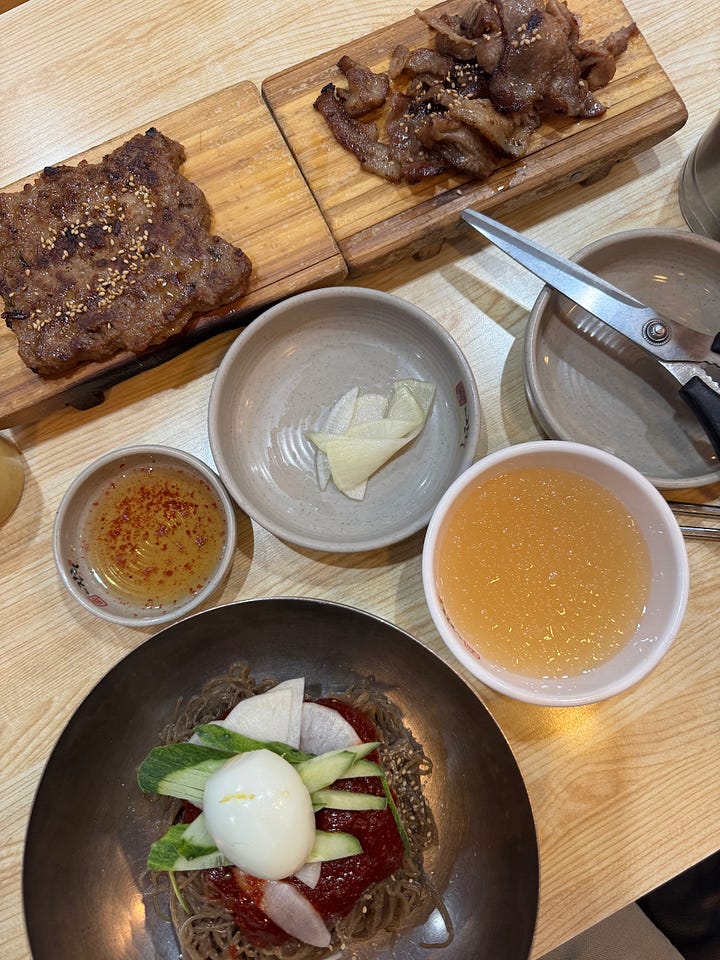
Almost everything I wrote above I could write about Japan, so why have I chosen Seoul over Tokyo as my Asian hub? Because I find Seoul to be a lot less uptight, and Koreans a lot more welcoming. That’s not to say the Japanese can’t also fun, but in comparison to Tokyo, being in Seoul is akin to being at the kids table during Thanksgiving, away from the stuffy adults droning on about whatever adults drone on about.
The Koreans have long been regarded, by the Japanese and others, as the unrefined hicks of Northern Asia, the crude mountain people, which is probably the real reason I prefer being in Korea. I have a lifelong instinctive empathy for any group tagged as unsophisticated, and would rather go to the dive bar than the fancy cocktail lounge. While Japan does have it’s seedy, rough, dive bar side, it feels artificial. The Japanese can’t do anything without trying to make it perfect, even imperfection. Seoul has little trouble pulling that off.
Yet, despite all that, and probably because of it, when I’m in Seoul for more than five days I end up feeling empty, drifting, and eventually exasperated. While I don’t get depressed, I do find myself becoming uncontrollably annoyed with what can come to feel like a vapid thinness enveloping me.
When that feeling hits me, I grab a book, go to my local cafe, and read a Korean novel, cocooning myself to remind me there’s more to Seoul, only to be confronted by it again as I walk the streets back to my apartment.
Seoul is a hyper-consumer society, proudly celebrating having escaped from its impoverished past by loading up on buying things. Especially fuzzy things. Seoul is overwhelmed, inundated, and festooned with the cute. You can't escape it. Everything is a cartoon character, even the food you're about to eat!
I wrote about this after my first trip to Seoul,
The younger generation seems to be dealing with the rampant consumption and materialism, and the emptiness that results, by embracing the cute.
If you make anything and everything a lovable character, that dampens the edges. Makes a life of buying and selling stuff a little less dreary. A little less pointless.
I am all cool with anthropomorphizing anything and everything. But when turned into a worldview, its pretty depressing.
And in Seoul, its close to being a worldview. The culture of the cute is younger Koreans way of coping with a dystopia soulless future thick with consumption and thin on the transcendent. A quasi religion of fuzzy things, that replaces prayer and meditation with the awwwwwwwwww.
That is a shallow way to build a culture, but one that makes perfect sense in a consumer society. Collect more fluffy cute characters to find deeper happiness. Buy more collectables to be fulfilled.
I have never seen a functional society that is happy and content, that doesn’t have some form of religion, faith, meditation, or the aesthetic. Some way to provide meaning, guidance, and community, while also elevating life about the mundane and above the material.
Trying to do that with the cute is like putting lipstick on a pig.
Or putting lipstick on an Octopus. A cute Octopus. One that that you will eventually kill then eat.
While I have moved beyond my annoyance with the cute to focus on the best in Korea, a lingering irritation with this cultural slightness has never left me.
The thinness in Korea is more than just about cuteness though. There is also an almost fanatical emphasis on image over substance, as well as the desperate need for immediate, worldly pleasure, whether through food, drink, buying the latest clothes, makeup, or plastic surgery.
In Plato's Gorgias, Socrates uses the metaphor of a leaky vessel to explain why a life devoted to hedonism is ultimately futile and pointless. He compares the undisciplined soul to a bucket riddled with holes that consequently can never be filled, no matter how much is poured into it. In contrast, he describes the disciplined soul as an intact bucket that, once filled, remains full. Or, once you find a Truth larger than the here and now, you're filled and content, without the continual need to reboot your physical pleasure.
It's an analogy that stuck with me because it's how addicts describe their addiction. An itch that needs to be scratched again every day. "You wake up and you realize you gotta do all this shit over again. All this running around getting the money, all to get a bag to put straight in your arm to stop the craving, knowing it's gonna be exactly the same tomorrow and the day after and the day after. You're nothing more than a mouse on a wheel getting nowhere."
So when I'm in Seoul I end up seeing everyone as constantly running around holding Plato's bucket full of holes, leaking, desperately pouring more and more in it to keep it full; buying makeup, shirts, shoes, accessories, or Instagramming their slice of cake, or going into a selfie photo-booth after applying makeup while holding their cute stuffed animal. A futile and empty attempt to keep the ever-leaking bucket of happiness full, to feel alive again for a few hours, before you have to rush off and do it all over.
That's not entirely fair because while I do believe Korean culture is overly obsessed with image and with material things, here in the US we're a more extreme version of hedonism. We have a grosser form of epicurean overload, residing at the tippy top of the materialist mountain, with Korea far below us. Just sit in a Dunkin' Donuts in the morning and watch as people drive up in monstrous cars almost the size and cost of a Korean's apartment, order the extra large frozen coffee with extra sugar, whole milk, and five pumps of caramel swirl syrup, and four maple bacon donuts.
So why does this thinness seem so much more pronounced when I'm in Seoul than when home in the US? Or in Tokyo? Or especially Vietnam?
A few theories and observations!
Group think and lack of diversity
Back when I was a banker, I lost a round of office politics3 and my punishment was managing our investment in a small Korean bank for a year. That meant I did four Seoul business trips in 1999, and hated them all, because they were endless meetings of bowing, hand-shaking, and droning on and on about a financial market I didn't care about.
The one bright spot I found was the tea. Each meeting began with a young woman bringing a pot of green tea and a few cookies. At the time I was a tea fanatic, and it was the best green tea I'd ever had.
One day, while looking around a mall between meetings, I asked my chaperone, a very eager and bouncy Henry Kim, where were all the tea shops, because all I saw were new coffee chains. Lots of them. Henry, not missing a beat, said, "Oh, we decided to switch to coffee a few years ago." To which I said, "We?" and he said, "Yes, we," and I said, "So you mean we as in all of Korea," to which he said, while giving me his usual ‘pitying the naive waegugin he had to pretend to respect’ look, "Yes, all of Korea."
Since then, I've come to see Korea as resembling a single high school freshman class, quick to embrace collective trends. While that’s an unfair over-generalization, it has proven to be a surprisingly useful framework over the years.
It’s also why I think Korean culture feels thinner than it is, because the mono-mania, where everyone does the same thing at the same time, before switching to the next thing, makes the culture feel especially cute, jejune, and puerile.
In contrast, American hedonism is more varied, making it less overwhelming and easier to escape, since it lacks Korea's oppressive uniformity.
Korea has modernized too quickly.
Another oversimplified heuristic for Korea is that it suffers from Japan envy, and that is what has driven their hyper-fast modernization of the last sixty years, a process that has been done with a dogmatic national intensity — the one fad that never changes for this high school class — which has denuded Korean culture of much of its tradition.
They have shed their past so quickly, and so fully, to get where they are, which is within spitting distance of the Japanese, that they are now divorced from their generational and cultural meaning, cleaving by only fingertips to a remembrance of what Korea once was.
That breakneck modernization (I don't think any large country has gone from third to first world, or autocracy to democracy in such a short time) has left the younger generations spiritually dislocated, detached from Korea's profound heritage.
It is a detachment you find in much of Asia, with the exception of Japan, which has managed to modernize while maintaining a respect for its past that is genuine4.
This rapid modernization, while remarkably successful, has not unleashed a great national wave of pride, but instead brought a national sense of "Wait, is that all there is? What did we do this for?" infused with a regret for what they have given up to get here.
Koreans are obsessed with their image
Adding to Korea's vapidness is their near-fanatical attention to image, even in mundane activities like hiking.
Seoul is great for walking and Koreans love to do it. There is a vast network of popular hiking trails, including the one hundred and sixty-kilometer Seoul trail that encircles the city. While I highly recommend using them, you can expect to spend a fair amount of time stuck behind packs of retirees, outfitted like they are heading off to climb Everest. Koreans take their hobbies seriously, and no matter if they are playing golf or croquet, they all dress almost exactly like each other, in the latest and fanciest gear.
It's almost like they enjoy looking like a hiker more than they enjoy the hiking.
That vapid focus on appearance is especially pronounced with women, who obsess over their looks, with gobs of make-up, expensive clothes, and then a lot of plastic surgery. Lots. I’ve grown used to seeing otherwise perfectly attractive young women with bloated post-surgery faces. Or the ubiquitous white make-up mask that ends abruptly at the ears, chin, and hairline.
A few trips ago, bored on the metro, I noticed every woman on my car was either flipping open their phone or a cosmetic mirror, fixing their hair or applying makeup. Since then, I can't not see it, over and over, and I've taken an informal survey whenever on any public transportation, and Korea leads the world in this measure by far. The only place close was Warsaw, and that was a distant second.
Maybe Korea culture is indeed thin!
As I wrote earlier, part of the appeal of Korea relative to Japan is it’s less uptight, less refined so more like the kids table at Thanksgiving. Another way to put that is that there is indeed simply less cultural depth in Korea.
Before you yell at me, Korea does have a high brow culture that punches above its weight, including an extensive literary scene. I make a point of trying to read novels from each country I visit, and finding excellent Korean literature has been exceptionally easy5.
Korea has been rewarded for that, and they now have a Nobel Prize in literature (although I find the winner, Han Kang, to be one of my least favorite Korean writers), as well as a highly regarded film industry that produces movies that often outclass Hollywood, in popularity with the masses, as well as with critics and intellectuals.
Yet all of that is overshadowed by the more juvenile parts of Korean culture, including K-pop, with its meticulously choreographed artifice, its hyper-stylized vacancy, its manufactured spectacle, that has become their largest cultural export, drawing even me in, unable to stop gawking at the videos when I see them.
Its success has changed Korea. It’s an addictive aesthetic, that tends to corrupt all it touches, and combined with Korea's obsession with cuteness, its fast fashion, makes being in Seoul feel like you’re an actor in a twee and precocious high school play.
Still, no matter what the answer, Seoul remains my favorite global city and I’ll keep going back. Some of that’s because I know I’m being unfair and there’s a lot more to Korea I’ve yet to discover, but it’s more because while Korea might tend towards the hedonistic, might be a little vapid, it’s also extraordinarily warm and welcoming, and no amount of high-brow culture can top that.
I leave this Friday for Milan, and will spend the next three weeks walking to Aprilto Padua. I’ll hopefully post in a few days more about this trip, including the most likely path, but if you happen to find yourself in Northern Italy and want to join for a days walk, or an everning meal, please reach out to me.
After that my schedule for the next few months is,
April 18th - May 6th: Walking from Milan to Padua.
May 23rd - June 8th: Walking Ishikawa province (Japan), starting and ending in Kanazawa
July 4th: Sao Paulo,
July 12th: Asunción Paraguay, then Salta and Jujuy provinces Argentina.
Seoul makes an excellent Asian transit hub for several reasons. Direct flights from NYC to Seoul are relatively inexpensive and comfortable, with Korean Air, Asiana, and the newer Player airline all offering good service (though I prefer Korean Air). Once in Seoul, Incheon airport provides convenient connections to the rest of Asia, with particularly good options for reaching central Asian destinations.
I've found myself returning to Seoul regularly partly because three years ago, during a round-the-world trip, I needed a Seoul-to-NYC flight. Since booking a round-trip ticket cost almost the same as a one-way fare, I purchased the round trip with a return date several months in the future.
This pattern of buying round-trip tickets instead of one-way flights has continued in a cycle that keeps bringing me back to Seoul, which I'm quite happy about.
I don’t do shots, and never have. All my life I've limited my alcohol to beer and a little wine. For the past four months, I've rarely had even these, except when visiting Woodstock, and then only a few bottles. Waking up feeling fully healthy and clear-headed has become too important to me these days, especially when facing a fifteen-mile hike with a heavy backpack.
Largely because I was up until that moment I was unaware of office politics.
Why Japan has pulled this off I don't have an answer to, but would love to hear from those of you who know more than me about it.
I highly recommend “Your Republic Is Calling You”, by Young-ha Kim, which I just finished, as well as “Tower” by Bae Myung-hoon, which I just started.

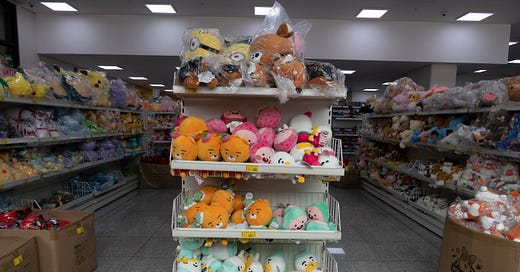



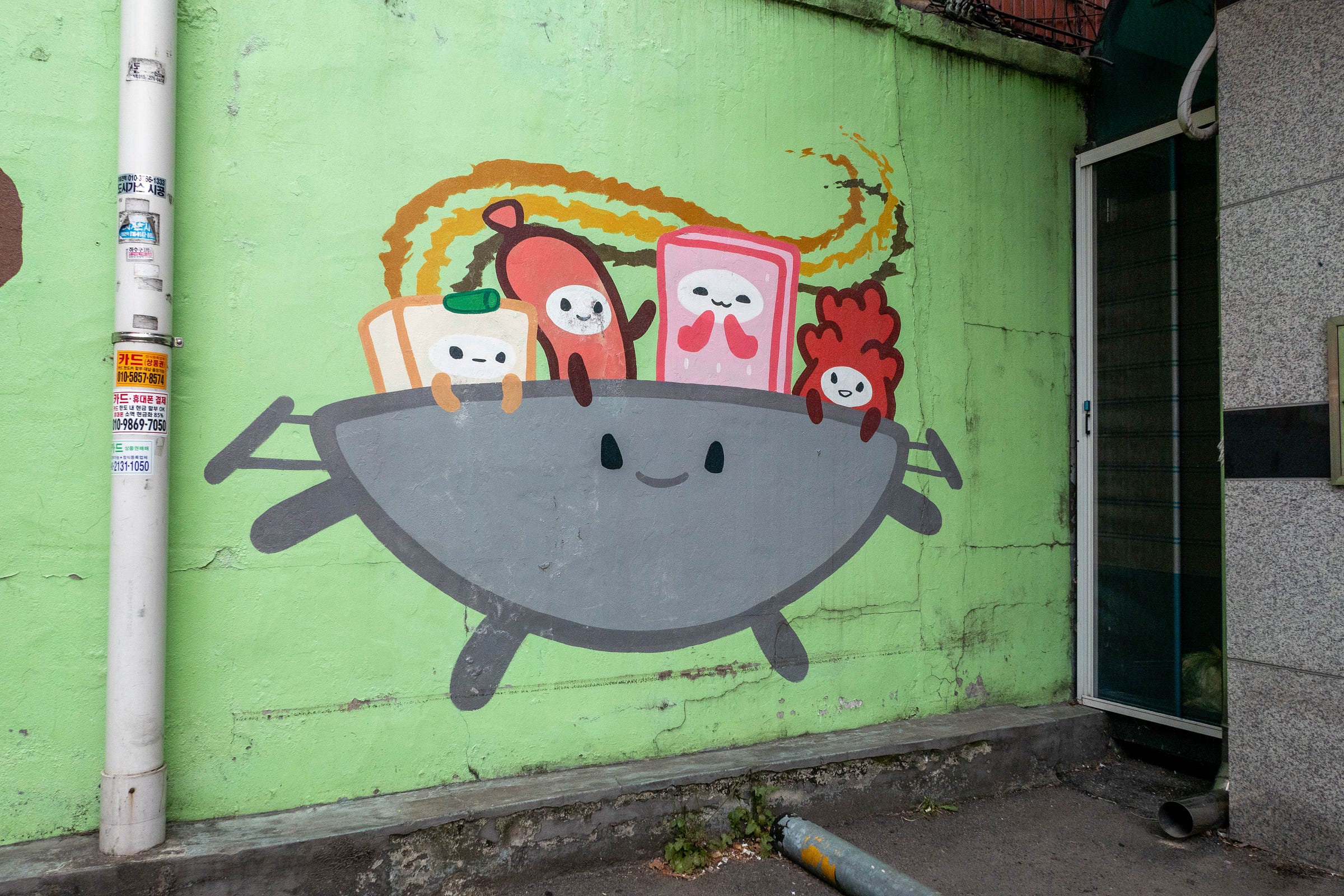

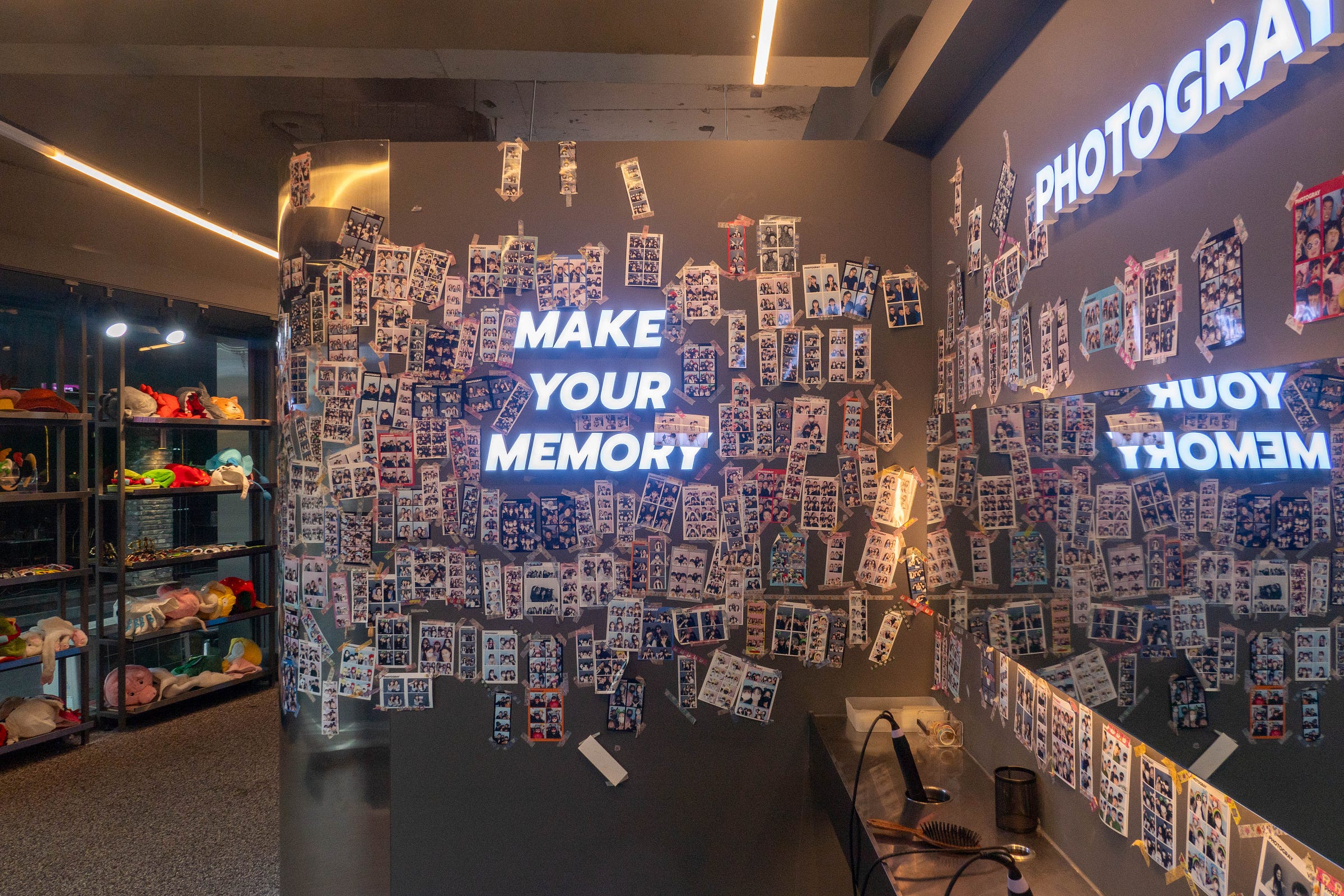

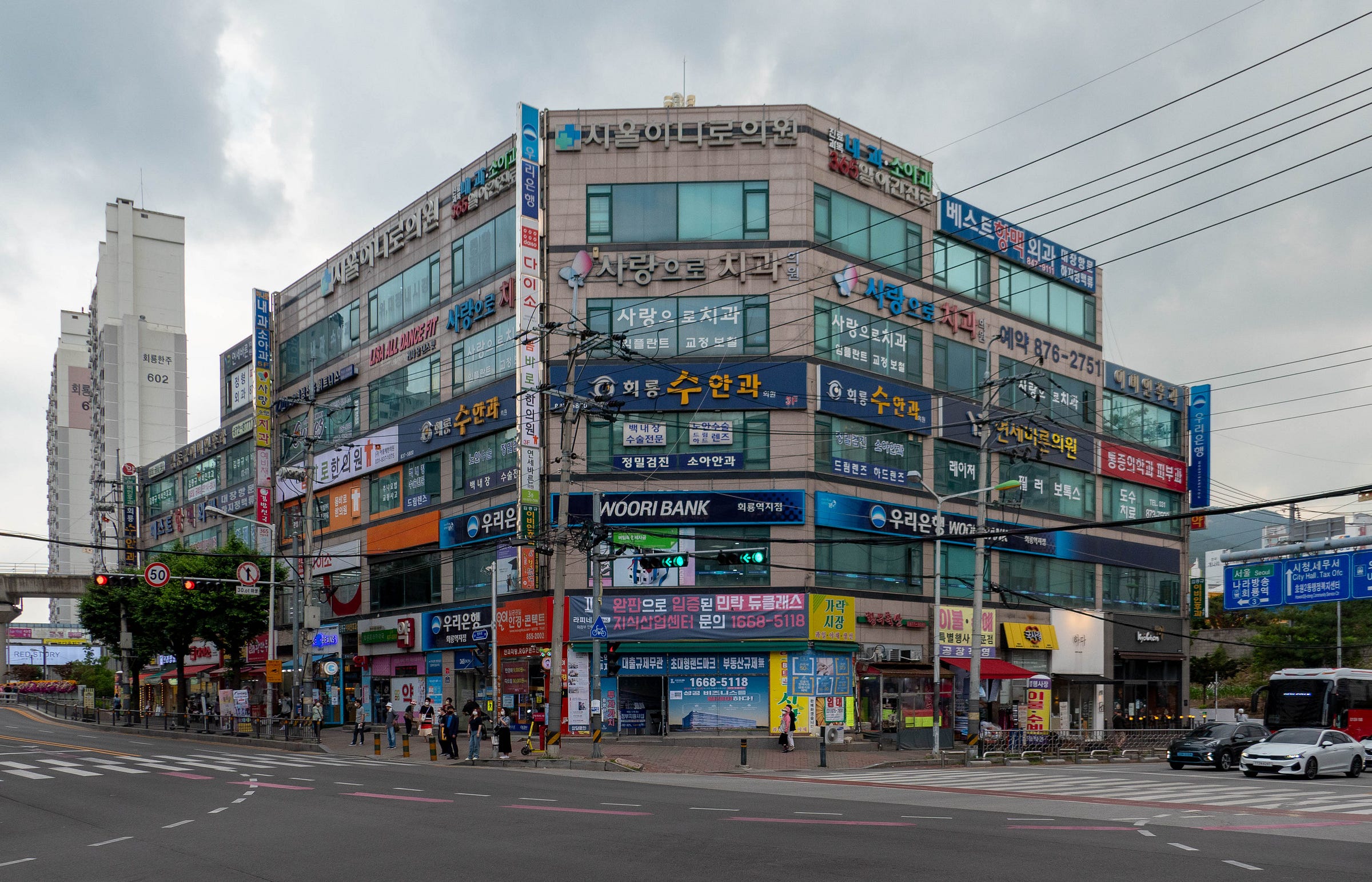

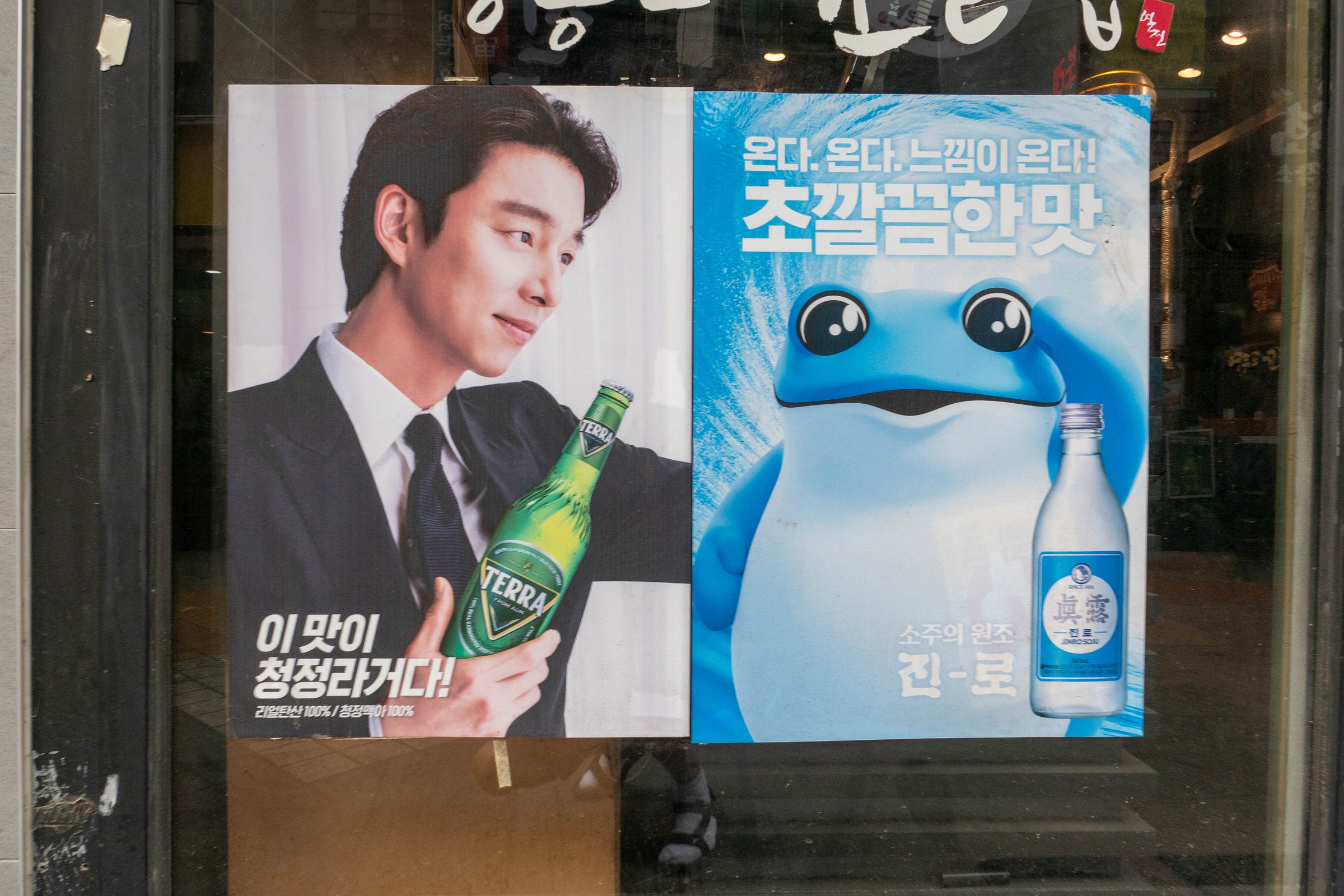
I’m a Korean woman living in Seoul, and I read your essay with interest—and a small wince.
You’ve been to Korea five times, walked past us, eaten our food, enjoyed our LP bars. I’m genuinely glad. But much of what you describe reads like a diagnosis made in passing, and that’s where it gave me pause.
You say our serious culture “punches above its weight,” as if our realism floats above a base layer of fluff. But they’re not layers. We have highs because we have lows. We are deep because we are shallow. Because life is not only space. It’s time. It’s being there. And to be somewhere is not the same as walking through it.
I like your writing. I like your attention. But we’re not contradictions to be solved—we're lives you step into. I hope your curiosity continues—not just in observing, but in being here.
Long time Japan walker and cyclist here, although I probably haven't done as much as you. Quick thoughts on point 3: Japan wasn't nearly as devastated by war, and much of the physical remnants of the past are still lying around where they have always been. Not so much in city centers, as most major cities were bombed and rebuilt, but as soon as you are in the outskirts you are on land that has never been overrun by an army. I'm not sure that Korea has a square inch that wasn't trampled over in the last century. There is the syncretic nature of Shinto and Buddhism about which things could be said and has some effect on culture. The resistance to Christianity in Japan that is not as true of Korea seems to dovetail with interesting literature out there on the way Christianity dissolves kinship networks. The displacement of country people to Tokyo throughout the 20th century certainly severed a lot of traditional bonds, and although this displacement was lamented through enka songs, etc., usually one child out of several went to the city.